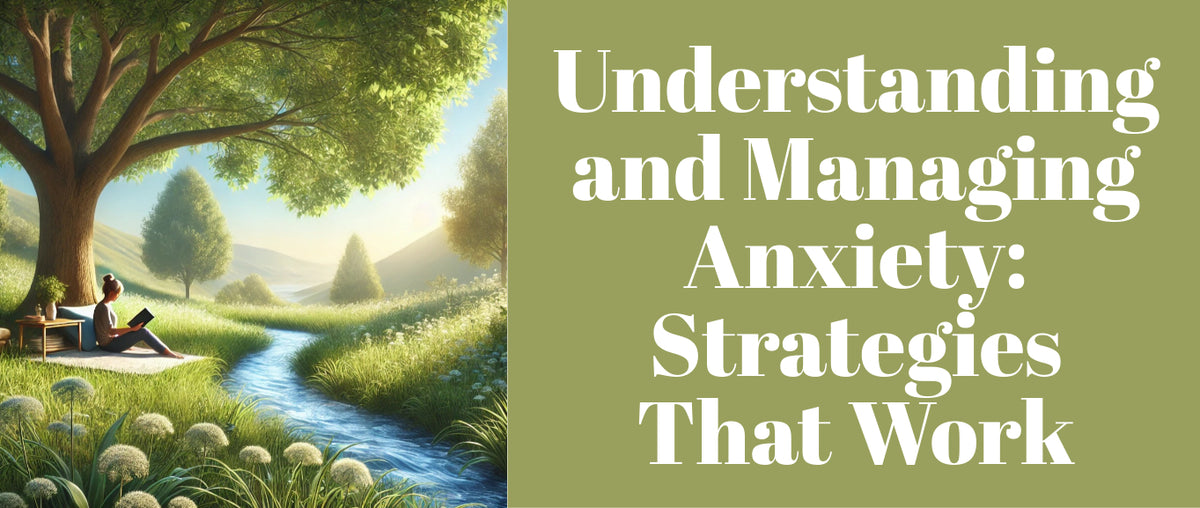Unlock the Secrets to Managing Anxiety: Strategies That Work
Anxiety is a common experience that affects millions of people worldwide. It is a natural response to stress or danger, but when it becomes overwhelming, it can interfere with daily life and well-being. Understanding and managing anxiety is crucial for maintaining mental and physical health and achieving a balanced, fulfilling life. This article explores effective strategies for managing anxiety, including lifestyle changes, psychological techniques, and the importance of professional help.
Key Takeaways
- Understanding anxiety and its impact on daily life is crucial for managing mental and physical health.
- Effective strategies for managing anxiety include lifestyle changes, psychological strategies, and self-care techniques.
- Seeking professional help and connecting with supportive communities can provide essential support and resources.
What Is Anxiety?
Anxiety is a feeling of worry, nervousness, or unease about an imminent event or something with an uncertain outcome. While it is a normal part of life, anxiety can become a disorder when it is excessive and interferes with daily activities.
Is Anxiety Helpful or Harmful?
Anxiety can be both helpful and harmful. On the one hand, it can be a motivator, helping you to prepare for challenges and stay alert. On the other hand, chronic anxiety can lead to physical symptoms such as increased heart rate, muscle tension, and fatigue, affecting your overall health.
Anxiety is a response mechanism developed by our ancestors as a survival tool. While today's world offers a different set of stressors, managing anxiety is as crucial as ever. Whether it's overcoming daily challenges or pursuing a healthy diet, understanding anxiety's dual role is essential. By implementing anxiety management strategies, such as incorporating Vegan Cheese and plant based foods into your meals, you can contribute to a heart healthy diet that supports both mental and physical well-being.
Common Symptoms of Anxiety Disorders
Anxiety disorders can manifest in various forms, including generalized anxiety disorder (GAD), social anxiety disorder, panic disorder, and more. Identifying the symptoms is the first step toward managing anxiety effectively.
Physical Symptoms
- Increased Heart Rate: Palpitations or a racing heart
- Sweating: Unexplained perspiration
- Trembling: Shaking or trembling, especially in hands
Emotional Symptoms
- Excessive Worry: Persistent thoughts of fear and worry
- Restlessness: Feeling on edge or unable to relax
- Irritability: Short temper or mood swings
Cognitive Symptoms
- Difficulty Concentrating: Trouble focusing or thinking clearly
- Racing Thoughts: Rapid, uncontrollable thought processes
Recognizing and addressing these symptoms early can be key to effective management.Engaging in activities such as incorporating Kombucha and Healthy Drinks into your daily routine can help maintain a balanced mental state.Pairing these practices with a healthy diet that includes options like Cashew Butter and Oat Milk can offer additional support to your mental health journey.

What Are the Symptoms of Anxiety?
Anxiety symptoms can vary significantly from person to person and may change over time.Understanding these symptoms can help you recognize when anxiety is affecting you and when to seek professional help.
Physical Symptoms
- Muscle Tension: Chronic tightness in the muscles
- Headaches: Frequent tension headaches or migraines
- Insomnia: Trouble falling or staying asleep
Emotional Symptoms
- Overwhelm: Feeling emotionally drained or paralyzed
- Fear: Persistent feeling of dread or doom
Cognitive Symptoms
- Overthinking: Analyzing situations excessively
- Catastrophizing: Expecting the worst-case scenario
By recognizing and addressing these symptoms early, you can take steps to manage your anxiety effectively. Incorporating cholesterol free foods and High Protein Vegan Food options into your daily meals can support a balanced lifestyle. Opting for vegan butter and Unsalted Butter as healthier alternatives can contribute to a heart-healthy diet, helping you to maintain both physical and mental well-being.
The Impact of Anxiety on Daily Life
Anxiety can have a profound impact on both your mental and physical health. Understanding its effects is crucial for managing anxiety and living a fulfilling life.
How Anxiety Affects Mental Health
- Emotional Strain: Chronic anxiety can lead to depression and emotional exhaustion.
- Relationship Challenges: Anxiety can affect communication and intimacy with loved ones.
How Anxiety Affects Physical Health
- Immune System Suppression: Chronic anxiety can weaken the immune system, making you more susceptible to illness.
- Digestive Issues: Anxiety can cause stomachaches, nausea, and irritable bowel syndrome (IBS).
Social and Professional Impact
- Work Performance: Anxiety can hinder concentration and productivity, affecting career growth.
- Social Interactions: Anxiety may lead to avoidance of social situations, limiting personal connections.
Understanding the broad impacts of anxiety allows for targeted management strategies. Adopting a healthy eating plan that includes low fat mayonnaise, parmesan cheese block, and Cheddar Cheese can contribute to a balanced, heart-healthy diet. These dietary choices, combined with incorporating plant-based protein into your meals, can support both your mental and physical health, helping you to thrive in all areas of life.
Anxiety Disorders
Understanding anxiety disorders is essential for developing effective management strategies. This section explores the various types of anxiety disorders and their prevalence.
What Is an Anxiety Disorder?
An anxiety disorder is characterized by excessive and persistent worry and fear that interferes with daily activities. These disorders differ from normal anxiety in terms of intensity, duration, and the impact on your life.
How Many Anxiety Disorders Are There? What Are They?
There are several types of anxiety disorders, each with unique symptoms and challenges.
- Generalized Anxiety Disorder (GAD): Characterized by persistent worry and tension, even in the absence of stressors.
- Social Anxiety Disorder: Intense fear of social situations and being judged by others.
- Panic Disorder: Sudden episodes of intense fear, often accompanied by physical symptoms like chest pain and shortness of breath.
- Phobias: Irrational fear of specific objects, situations, or activities.
- Obsessive-Compulsive Disorder (OCD): Involves recurring thoughts and repetitive behaviors.
- Post-Traumatic Stress Disorder (PTSD): Anxiety triggered by traumatic experiences.
Which Anxiety Disorder Is Most Common?
Generalized Anxiety Disorder (GAD) is one of the most common anxiety disorders, affecting millions worldwide.
Understanding the prevalence and characteristics of different anxiety disorders can guide effective treatment and management.
Incorporating Healthy Snacks for Kids and engaging in a Vegan Bodybuilding Diet can support a balanced lifestyle, contributing to mental and physical well-being.
Opting for high protein vegan breakfast options and high protein snacks can provide the energy and nutrients needed to thrive while managing anxiety effectively.
Effective Strategies for Managing Anxiety
Managing anxiety requires a combination of lifestyle changes, psychological strategies, and self-care techniques. These approaches can help reduce anxiety symptoms and improve overall well-being.
Lifestyle Changes
Incorporating lifestyle changes is a powerful way to manage anxiety and improve your quality of life. Here are some key lifestyle adjustments that can make a difference:
- Balanced Diet: Consuming a diet rich in nutrients supports brain health and helps manage anxiety. Incorporate vegan cheese, Cashew Butter, and plant based foods to maintain a balanced and nutritious diet.
- Regular Exercise: Physical activity releases endorphins, which are natural mood lifters. Activities like yoga, walking, or cycling can help reduce anxiety and promote a sense of calm.
- Sleep Hygiene Practices: Prioritize a good night's sleep by maintaining a regular sleep schedule, creating a restful environment, and avoiding caffeine or electronics before bedtime.
Embracing these lifestyle changes can complement a healthy diet and help you maintain a heart-healthy diet. Additionally, consider incorporating kombucha and Healthy Drinks to support overall wellness.
Psychological Strategies
Psychological strategies are vital for managing anxiety effectively. Here are some proven techniques:
- Cognitive-Behavioral Therapy (CBT): CBT is a structured, goal-oriented therapy that focuses on identifying and changing negative thought patterns. It helps individuals develop healthier thinking and coping strategies.
- Mindfulness and Meditation: Practicing mindfulness and meditation can help you stay present and reduce anxiety. Techniques like deep breathing, progressive muscle relaxation, and guided imagery can provide relief from anxiety symptoms.
- Journaling and Expressive Writing: Writing about your thoughts and feelings can be a therapeutic outlet for processing anxiety. Journaling helps identify triggers and patterns, enabling you to manage anxiety more effectively.
These psychological strategies are essential tools for anxiety management, empowering you to take control of your mental health and well-being.
Small Acts of Bravery
Small acts of bravery can have a significant impact on managing anxiety. By gradually facing fears and challenges, you can build confidence and resilience. Here are some ideas:
- Taking Small Steps: Break tasks into smaller, manageable steps to avoid feeling overwhelmed. Celebrate each accomplishment, no matter how small.
- Gradual Exposure: Gradually expose yourself to anxiety triggers in a controlled environment. This process, known as desensitization, can help reduce the fear associated with specific situations.
- Celebrating Successes: Recognize and celebrate your successes, no matter how minor they may seem. This practice reinforces positive behaviors and builds self-confidence.
Engaging in small acts of bravery can complement a healthy eating plan, providing the mental strength needed to overcome anxiety challenges.
Challenge Your Self-Talk
Self-talk, the internal dialogue that influences your thoughts and feelings, plays a significant role in anxiety management. Here's how to challenge negative self-talk:
- Recognizing Negative Thought Patterns: Identify patterns of negative self-talk that contribute to anxiety. Common patterns include catastrophizing, overgeneralizing, and all-or-nothing thinking.
- Replacing Negative Thoughts: Replace negative thoughts with positive affirmations and realistic statements. For example, replace I can't handle this with I am capable and can manage this situation.
- Practicing Positive Self-Talk: Develop a habit of positive self-talk by regularly practicing affirmations and self-encouragement. This shift in mindset can boost confidence and reduce anxiety.
Challenging your self-talk is a powerful tool for managing anxiety and promoting a positive mindset. Incorporating cholesterol-free foods and High Protein Vegan Food options into your diet can further support mental clarity and well-being.
Be Kind to Yourself
Practicing self-compassion and kindness toward yourself is essential for managing anxiety. Here's how to cultivate self-compassion:
- Practicing Self-Compassion: Treat yourself with the same kindness and understanding that you would offer to a friend. Recognize that everyone experiences challenges and setbacks.
- Avoiding Self-Criticism: Challenge the tendency to be overly critical of yourself. Instead, focus on your strengths and accomplishments.
- Importance of Self-Care: Prioritize self-care activities that nurture your body and mind. These can include hobbies, relaxation techniques, and spending time with loved ones.
Being kind to yourself fosters a supportive environment for managing anxiety. Complement these practices with a heart-healthy diet that includes vegan butter and unsalted butter as healthier alternatives.
Plan Worry Time
Planning worry time is a structured approach to managing anxiety. Here's how it works:
- Scheduling Worry Time: Set aside a specific time each day to address your worries. This practice allows you to compartmentalize your anxiety and prevent it from taking over.
- Limiting Worry: During your designated worry time, focus solely on your concerns. Afterward, shift your attention to positive activities and distractions.
- Reflecting on Worries: Reflect on your worries and evaluate their validity. Consider solutions or coping strategies for each concern.
Planning worry time helps you regain control over your thoughts and reduces the impact of anxiety on your daily life. Pairing this practice with a healthy diet rich in plant-based protein and high protein vegan breakfast options can support overall well-being.
Get to Know Your Anxiety
Understanding your anxiety is crucial for effective management. Here's how to get to know your anxiety:
- Identifying Triggers: Identify the situations, people, or environments that trigger your anxiety. Keeping a journal can help you track patterns and trends.
- Understanding Personal Responses: Recognize how your body and mind respond to anxiety. This awareness allows you to implement targeted coping strategies.
- Developing Coping Mechanisms: Develop personalized coping mechanisms that align with your anxiety triggers and responses. These can include relaxation techniques, mindfulness exercises, and grounding practices.
Getting to know your anxiety empowers you to take proactive steps toward management. Incorporating high protein snacks and Oat Milk into your diet can provide the nutrients needed to support a balanced lifestyle.
Connect with Our Online Peer Support Community
Connecting with a peer support community can provide valuable insights and encouragement for managing anxiety. Here's why it's beneficial:
- Benefits of Sharing Experiences: Sharing your experiences with others who understand your challenges can provide comfort and validation. It reminds you that you are not alone in your journey.
- Accessing Support Groups: Joining support groups and online forums can connect you with individuals who share similar experiences. These communities offer a safe space for sharing, learning, and growing together.
- Engaging in Online Communities: Engage with online communities dedicated to anxiety management. Participate in discussions, share tips, and seek guidance from others who have navigated similar challenges.
Connecting with a peer support community complements your efforts to manage anxiety effectively. Embrace a Vegan Bodybuilding Diet that includes high protein vegan breakfast and high protein snacks to fuel your body and mind.
Managing and Treating Anxiety
Managing and treating anxiety involves a combination of self-help strategies and professional guidance. This section explores effective approaches to anxiety management.
How Can I Manage My Anxiety?
Managing anxiety requires a proactive approach tailored to your individual needs. Here's how to create an effective anxiety management plan:
- Developing a Personal Plan: Create a personalized plan that includes lifestyle changes, psychological strategies, and self-care techniques. Regularly assess and adjust your plan to align with your evolving needs.
- Incorporating Healthy Habits: Incorporate healthy habits such as regular exercise, a balanced diet, and sufficient sleep into your daily routine. These habits contribute to overall well-being and reduce anxiety symptoms.
- Utilizing Relaxation Techniques: Practice relaxation techniques such as deep breathing, progressive muscle relaxation, and guided imagery. These techniques can help calm your mind and body during moments of anxiety.
Implementing these strategies can support your efforts to manage anxiety effectively. Pair them with a healthy eating plan that includes vegan cheese and cholesterol-free foods to support mental and physical well-being.
Professional Help and Treatment Options
Seeking professional help is a crucial component of anxiety management. Here's what to consider:
- When to Consult a Therapist or Counselor: Consult a mental health professional if anxiety significantly impacts your daily life. Therapists can provide personalized guidance and support.
- Overview of Medication Options: In some cases, medication may be necessary to manage anxiety symptoms. Work with a healthcare provider to explore medication options and determine the best course of action.
- The Role of Support Groups and Community Resources: Engage with support groups and community resources that offer additional support and guidance. These resources can provide valuable insights and encouragement.
Seeking professional help is an essential step toward managing anxiety effectively. Combine professional guidance with a heart-healthy diet that includes garlic butter and low-fat mayonnaise to support overall well-being.
Here Are Tips for Coping with an Anxiety Disorder
Coping with an anxiety disorder requires practical strategies and lifestyle adjustments. Here are 11 tips to help you manage anxiety effectively:
1. Develop a Daily Routine: Establish a structured daily routine to create stability and reduce anxiety.
2. Practice Mindfulness and Meditation: Incorporate mindfulness and meditation into your daily life to promote relaxation and reduce stress.
3. Engage in Regular Physical Activity: Stay active with regular exercise to boost mood and improve mental health.
4. Maintain a Balanced Diet: Consume a balanced diet rich in nutrients to support brain health and reduce anxiety.
5. Prioritize Sleep and Relaxation: Ensure adequate sleep and relaxation to recharge your body and mind.
6. Use Positive Self-Talk and Affirmations: Challenge negative thoughts with positive self-talk and affirmations to boost confidence.
7. Break Tasks into Smaller Steps: Avoid overwhelm by breaking tasks into manageable steps and celebrating progress.
8. Limit Caffeine and Alcohol Intake: Reduce caffeine and alcohol consumption, as they can exacerbate anxiety symptoms.
9. Connect with Supportive Friends and Family: Seek support from friends and family who understand and encourage your journey.
10. Practice Deep Breathing Exercises: Use deep breathing exercises to calm your mind and body during moments of anxiety.
11. Seek Professional Help When Needed: Reach out to a mental health professional for personalized guidance and support.
Implementing these tips can enhance your ability to manage anxiety effectively. Pair these strategies with a healthy diet that includes Cheddar Cheese and parmesan cheese for added nutritional support.
Conclusion
In conclusion, understanding and managing anxiety is a journey that requires a holistic approach. By incorporating lifestyle changes, psychological strategies, and self-care techniques, you can reduce anxiety symptoms and improve your overall well-being.
Embrace a healthy diet rich in plant-based foods and high protein vegan breakfast options to support both mental and physical health. Remember to seek professional help and connect with supportive communities for additional guidance and encouragement.
Take charge of your anxiety management journey and prioritize your mental health. With the right strategies and support, you can lead a balanced and fulfilling life.
Do you enjoy vegan food? We have a list of vegan restaurants in India to help you find delicious options in your area!










